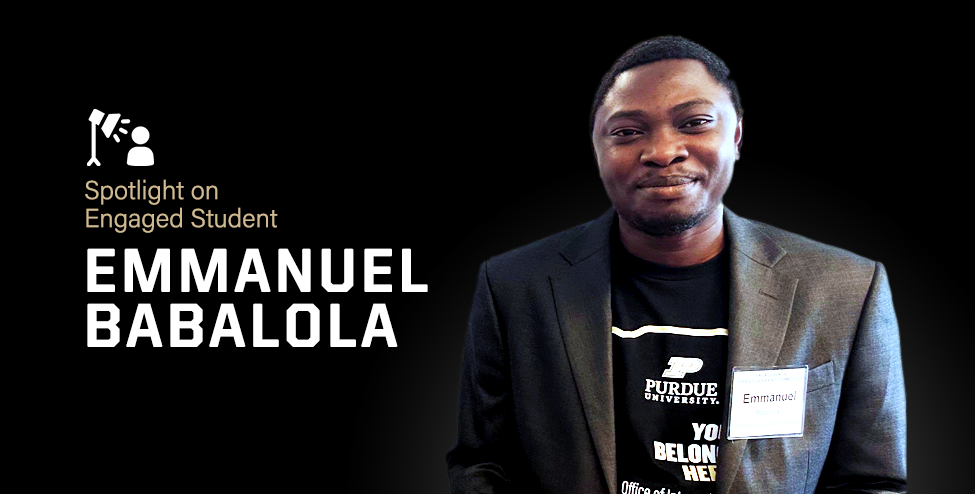Spotlight on Engaged Student: Emmanuel Babalola

Students like Emmanuel Babalola embark on tireless exploration into the persistent gap between theoretical knowledge and practical application and strive to witness the real-world implications of what they have learned.
Embracing service-learning and engagement is not only a way to expand your education, but is also “an essential component that completes the learning journey,” according to Emmanuel Babalola, a third year Ph.D. student specializing in Learning, Design, and Technology within the Curriculum and Instruction field.
Babalola is one of the 2024 Engagement and Service-Learning Summit speakers. At the Summit this Leap Day, he will be discussing how his work contributed to the success and impact of the Physics is Fun Project in a lightning talk titled: From Little Explorers to Future Scientists: Nurturing Early Interest in STEM with the Physics is Fun, Project. The project aims to promote an interest in physics among young learners aged 5 to 12. The project’s unique approach blends instructional design and motivational design to create an engaging and relevant learning experience. Development of the project was guided by the analyze, design, develop, implement, and evaluate (ADDIE) framework and Keller’s attention, relevance, confidence, and satisfaction (ARCS) theory and utilized storytelling and hands-on learning strategies to bring physics to life through the story of a young physics enthusiast who is passionate about building a dream car (Babalola, et. al, 2023). The Physics is Fun Project is discussed in more detail in the Purdue Journal of Service-Learning and International Engagement.
Babalola serves as lead coordinator for the project, one of the pioneers International Students and Scholars (ISS) Ambassadors, and a student Ambassador for the American Physical Society (APS). When asked about key takeaways from these roles, Babalola shared that his heart is in motivating young learners and making an impact in the community.
“I find joy in assembling STEM kits for recreational purposes. My enthusiasm extends to engaging with young, passionate learners through various avenues, including volunteer work… I believe in the power of service and volunteerism. My research focus revolves around the intentional integration of parents in their children’s learning, exploring how this involvement can sustain and optimize intrinsic motivation,” said Babalola.”
In deeper discussion of engagement initiatives, Babalola shared how two young learners inspired him.
“At our inaugural event, a volunteer named Zainab Saka impressed us all. Her ability to convey complex concepts to a child, who then became a mini-teacher for others, was truly heartwarming. Another unforgettable moment unfolded during our 7 Weekends of STEM Exploration. Surprisingly, a 5-year-old, not within our target age group, attended every session. His mastery of the material, evident in his responses to our challenging questions, astounded us. His mother’s feedback about the transformative impact of our events on her child was incredibly rewarding,” Babalola shared.
These experiences demonstrate the power of reciprocal partnerships of service-learning and engagement among faculty, students, and community partners.
Babalola utilizes STEM-based activities and a storytelling framework guided by the Self-Determination theory in his approach to his work. He shared that support from the Office of Engagement has played a major role in the impact of his work.
“The Office of Engagement is a beacon in navigating the challenging landscape of funding. With the accessibility of service learning and engagement grants, the burden on my cognitive load diminishes,” commented Babalola.
Translating academic theories and instructional design principles into tangible actions (a theory in practice) is something that Babalola prioritizes. This can be expanded to creating avenues for understanding the dynamics of working within diverse communities and engaging with people from various backgrounds.
The Office of Engagement is a beacon in navigating the challenging landscape of funding. With the accessibility of service learning and engagement grants, the burden on my cognitive load diminishes.
Emmanuel Babalola
These skills have helped Babalola overcome challenges that have come up in his work. Like many who work in the community, Babalola has had difficulty finding volunteers who are available. In response, he implemented a contingency plan by integrating parental engagement into activity design.
“When all volunteers are present, we minimize parental involvement, but in their absence, we maximize it… service-learning involves forming partnerships with community hosts to address specific identified issues. Beyond its external impact, it serves as a personal journey of self-discovery, helping me become more flexible and ready to adapt,” said Babalola.
Babalola is eager to share how his pursuits reflect his commitment to making a lasting impact in both academic and community settings at the Engagement and Service-Learning Summit.
The Office of Engagement is excited to invite community partners, faculty, staff, and students from across Purdue’s campuses to the Engagement and Service-Learning Summit where we are celebrating “Giant Leaps, Local Impacts” with lightning talks by six incredibly engaged faculty, staff, students, and community partners! Register to attend the February 29th Summit today at https://www.purdue.edu/engagement/summit.